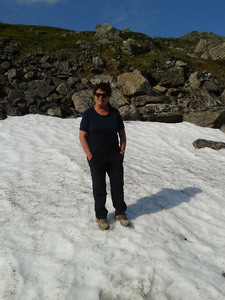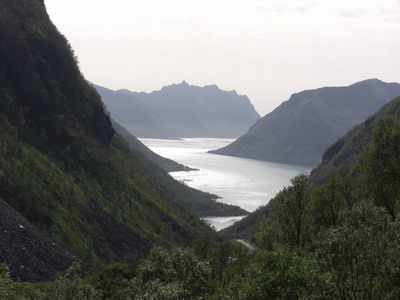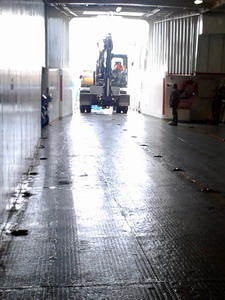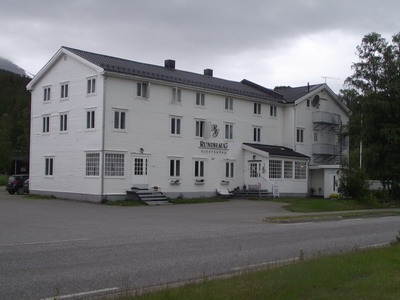

A TRIP TO THE NORTHERN NORWAY ISLANDS
AROUND TROMSO
With
a few days break between the European Open and
Youth Bridge tournaments in Tromso Norway, Eitan and I hired a car and
made our
way to the outlying islands.
12
July
Tunnels
in Norway constantly fascinated us. To leave
Tromso we drove through a remarkable tunnel warren with traffic circles
and about
six left and right exits and crossed over to Kvaloya Island.
We
took the winding coastal road and drove to our unpronounceable
B&B Yddrasiltunet which even Norwegians say is hard to pronounce.
It is a
Viking name meaning Tree of Life. The two-roomed wooden cabin was
situated on a
hill overlooking Bakkejord. I was told that we had a shared toilet and
we were
thankful to find ourselves alone in the cabin. Yes we did have the
toilet to
ourselves, but the shower was in the beautiful community house a few
cabins
away.
After
dropping off our bags, we continued driving
around the island, making our way to the beautiful Ersfjordenboten.By
this time
we were hungry and we were advised to drive in the direction of
Tromvick to
eat. The
place really was delightful with people sitting around tables on the
lush green
grass with a magnificent view of the sea. We learnt that they only
served tea
and cakes. On enquiring where the nearest restaurant was, we were
directed back
to Tromso! So we had to do with a cinnamon bun and rhubarb cake.
After
tea and cake we continued in the direction of
Belvik to take a ferry to some outer islands.
Just
before a tunnel through the mountain there was a parking
lot with
many cars. We stopped there too to see
another magnificent view.
At
the bottom of the steep grassy mountain
(under
which the tunnel went) was a grey stony area. It took us some moments
to realize
that there was a woman lying quite still face down on the rocks. Three
medics
were on their way to her and we watched as after quite a long time she
began to
respond, but could not move her arms or legs. They tied her legs
together,
wrapped her in aluminum - it was very cold - and covered her with a
blanket and
then turned her over to wait, we imagine, for further rescue. What
struck us
that although there were people in the parking lot close by she was
quite
alone. This would never happen at home.
We
continued through the tunnel to Belvik where we
parked our car and boarded the 17.10 ferry; no cars only people at this
stage.
We stopped at Vengsoy to let off someone and sailed among beautiful
scenery of
mountains with snowcapped peaks and tiny islands, enjoying a fine
summer’s day Our next stop was
at Sandoya the
furthest point of the ferry. Many people used to live at this fishing
station
until
the latest restrictions on fishing. All have left the island, except
one man,
Dave, a Dane. He looks after the
houses -
they looked in fine condition - and nowadays people go there for
weekends in
summer. A loner, his house is quite separate, a long walk from the
jetty. The
ferry also brings his mail and supplies.
On
the way back we made 2 stops to pick up 2 cars,
cyclists, hikers with dogs and people returning home after the weekend.
 One
dog
was terrified by the shaking of the ferry and found a little comfort
from me
One
dog
was terrified by the shaking of the ferry and found a little comfort
from meWe
drove back to our B&B and in the community
house in front of large picture windows enjoyed fish soup at 23.00 in
bright
sunlight. We showered there and then returned to our cabin and tried to
go to
sleep in the bright sunlight of 1.00am. We often wondered how the sun
makes its
way from NW to NE when we are not looking. The sun is never overhead,
but low
on the horizon. The brightest sunlight is not at noon but at 3.00am.
13
July
After
a nice breakfast and a lovely view we drove to
Sommaroy, a beautiful spot at the end of the road. We backtracked and
drove to
Brensholmen for the ferry to Bonthamn on the island of Senja. Even
though we
were very early there were people waiting who hadn't managed to board
the
previous ferry.
We
really didn’t believe it when we were told to
look out for reindeer. Once a herd of reindeer passed right in front of
our car. On Kvaloya we saw wild and farmed reindeer
often.
They are as common as mountain goats in Mitzpe Ramon and trot between
the
houses and along the roads. Our wait for the ferry was made pleasant by
a herd
of farmed reindeer repeatedly coming to the parking area. They had
bells tied
around their necks by a ribbon. They made a clip clip sound as they
trotted by.
One was an albino with magnificent antlers. Antlers are shed and
regrown
every
year, surprising, as they are made from bone. In summer the reindeer
shed their
winter coats and look rather messy.
When
our ferry arrived we watched fascinated as the crew
packed the vehicles into the hull. We are quite sure they went for
training to
a sardine canning factory. The sun was brilliant and the sea was
sparkling and
it was a very pleasant ride. We had the first of a number of views of
the
mountain that was supposed to be the inspiration for the Arctic
Cathedral in
Tromso (where Bill Pencharz and I had attended an organ recital.)
On Senja we drove along the National Tourist Route turning off to view various fjords, including Lougvil with a beautiful white beach and crystal clear waters and Husoy a magnificent island town bracketed by high mountains all around. The tunnels continued to amaze us: if they are on the main road they have 2 lanes, otherwise a single lane with bays to enable cars to pass. The mountains are so steep that until they blasted the tunnels the only access was by sea. When we reached Husoy, Eitan remarked that fishing must be the mainstay of the town because of the overpowering smell of fish, even though all the fishing boats were docked. We saw rows and rows and rows of wooden structures. At first we thought they were drying and salting cod fish, which is regularly served in Tromso, but on closer inspection it turned out they were dried salmon heads waiting to be shipped off to somewhere and ground into fishmeal.
Most
of the salmon that we eat today is from farmed salmon. In many fjords
we saw
rings in the water where the salmon are reared.
Throughout history Norwegians have made a living by harvesting the sea
through
fishing, whaling and sealing. When faced with fishing restrictions at
the end
of the 1960’s, salmon rearing began in earnest. Norway has become the
world’s
largest producer of farmed salmon, and farmed salmon is now the fourth
biggest
export commodity behind oil, gas and metals.
We
also visited Mefjordvaer and Baever which had a
marvelous view of jagged mountain tops called devil's teeth.
We ended the day at Hamn I Senja, a delightful resort strung along a series of docks. Although three rooms had a shared entrance, we were delighted that we had both a toilet and shower to ourselves! The food was good and the views magnificent. Hamn was founded in the late 1800’s to serve a now defunct nickel mine. It was powered by one of the first modern hydroelectric power stations.
14July

 We
continued through winding roads and tunnels until
we came to the breathtaking views of Sifjord then returned to Hamn for
the
night.
We
continued through winding roads and tunnels until
we came to the breathtaking views of Sifjord then returned to Hamn for
the
night.15
July
On
arrival at Andenes we made our way to Whalesafari
to register, had a light lunch and checked into our hotel. We were very
impressed by Whalesafari. The large group was divided according to
language and
then guided through various stations of a small museum explaining the
development of whales, their bone structure and why some whales have
echolocation.
Baleen whales are filter feeders that feed on phytoplankton and zooplankton near the surface. Toothed whales need to search for their food, often at great depths, so while their lower jaws have big teeth to clamp on their prey, the area above their upper jaw is filled with cetacean oil that amplifies the frequency of their echolocation. When I worked as a cosmetician I was aware that creams contained spermaceti, but was never aware that it was whale oil. The blubber has other uses.
Before
the whale safari Eitan and I finally
succumbed to the Norwegian summer and bought gloves and hats and took
every bit
of warm clothing to the boat Reine.
Sperm
whales feed on
gigantic squid, nearly the same length as the whales and they need to
find
their prey at great depths. Eventually the whale, identified by its
fluke as
Johnny Handsome, hunched its back and raised its fluke out of the water
as it
began its graceful dive to disappear into the sea.
The crew assured us that Johnny Handsome would surface again in about
30
minutes and so he did. The down time was most welcome as we tried to
get warm
with tea and marie biscuits. A coastal patrol boat watched our boat to
make
sure we weren't causing the whale any distress. After
the whale surfaced and dived down a
second time, we were glad to be called for tea and a bun as we made our
way
back to the harbour, absolutely chilled to the bone.
Click for a short clip
of Johnny Handsome starting its dive
On
one beach when I felt the water I was surprised
as to how ‘warm’ it was, i.e. not freezing. It seems that part of the
Gulf
Stream that originates near Florida crosses the Atlantic and reaches
these
waters. That is why there are no ice
floes this far north, even though we were within the Arctic Circle.
Only male
sperm whales come this far north. The females with their young prefer
more
tropical waters. The female whale's milk is so concentrated and copious
that
baby whales can put on up to 100 kilos a day. Now that's impressive;
even with
the worst of my binging I can't match that! In
northern Norway a proscribed number of
Minke whales are hunted in summer as part of their traditional culture.
It was
a common item on Tromso menus. We did not eat it.
Back
at the Marena hotel in Andenes I got into the shower and with scalding
water
managed to thaw my frozen bones.
We
were impressed that at breakfast the following
morning a sign welcomed us to make sandwiches for lunch and even fill
our
thermos, all for 75 NOK (about $10) each . We thought that a good deal
and did it. We then
drove
to Bleik and continued to Stavre before turning back. Just outside
Andenes
there is Andoya, a space research station and museum where an Israeli
flag was
flying. Intrigued we stopped by. It appears that they have a summer
program for
young adults and an Israeli was taking part. We didn't have time to
visit the
museum but bought freeze dried food specially developed for astronauts
-
including freeze dried ice cream, an ideal present for our
grandchildren and perhaps
something to ignite their imagination.
After
a long wait we boarded the ferry at Andenes
back to Gryllefjord. As always we were fascinated how the men packed
the
ferries, this time including a huge hydralic shovel and a
truck. When we had to
return to our car we
had to find a way to get back to our car as the vehicles were so
closely parked
we couldn't pass.


We
then drove along the island of Senja, passing
many places we had visited a few days before.
We
reached the mainland
and made
our way to Rundhaug, a delightful cozy hotel with a great smell of
food. We
were told that supper was either salmon caught by one of the guests or
halibut.
caught by the cook. Hmmm... a hard choice for dinner. The hotel is by a
bend in
the river but a leafy tree hid our view of it.
We
had to reorganize our things as the following day
we had to return to Tromso from where I was due to fly home.
At
dinner
we were
informed that we would be served a three-course dinner of asparagus
soup (okay,
so no smoked reindeer) and meat and….. “What!” Both Eitan and I
exclaimed, “No
fish?” Well they weren’t handing out the halibut but we had fresh
salmon cooked
to perfection.
From
there I
flew back
home while Eitan girded himself for another major bridge tournament.